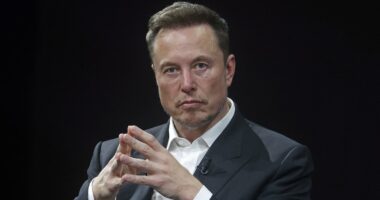Share this @internewscast.com
Unlock the Editor’s Digest for free
The British constitution, in its own form, gives voters a helpful guide on their electoral options. There is the government and then there exists the “official” opposition — His Majesty’s loyal opposition, to be exact. There are additional choices, but ultimately, your decision will likely be between these two.
However, the UK now has an unofficial opposition that has emerged unexpectedly. Remarkable local election results and consistent leads in opinion polls suggest that Nigel Farage’s Reform is becoming the primary alternative to Keir Starmer’s government. The surge in support for this party is causing a stir in Westminster, to such an extent that the prime minister is focusing speeches on criticizing a party with only five MPs.
Reform UK has experienced an exceptional year. Beyond its electoral successes, it now maintains approximately 30 per cent in the polls, placing it ahead of Labour and significantly outperforming the Conservatives. Farage receives extensive media coverage and frequently influences the political discussion. He has survived a risky conflict with one of his few MPs. Above all, Reform is thriving due to a Conservative decline at a time when the Labour government is facing increased unpopularity. While it might be an exaggeration to consider him as Britain’s imminent leader, it no longer appears entirely out of reach.
And yet, things are possibly going a little too well. Reform’s greatest risk may be peaking far too soon. Politics is littered with frontrunners or insurgents who seemed to be steaming to success only to fall short. The UK had the Social Democrats in the 1980s. Just three years ago Sinn Féin seemed set fair to be Ireland’s largest party but dropped from a poll high of 35 per cent in 2022 to 19 per cent at last year’s election.
Politics is a marathon and Reform now has to hold its lead for up to four years. That is a hell of a long time. Still, so far Farage’s strategy is going swimmingly. His poll leads give credence to his first goal of convincing people he has replaced the Conservatives as the primary opposition to Labour and that support for his party is not a wasted vote. He then counts on events like this week’s welfare policy announcement, local elections and next year’s Welsh and Scottish parliamentary polls to maintain his momentum.
Having solidified a core vote around immigration and nationality, Farage is trying to broaden his appeal by placing Reform in the electoral sweet spot of social conservatism and leftist economics. His pledge to reverse Tory welfare cuts over which Labour is still vacillating was perfectly opportunist and discombobulated Starmer’s nervous MPs. Time should allow Reform to ease its one-person dependency and build the profile of other leading figures.
More scrutiny is inevitable. Reform’s numbers — not least the crowd-pleasing pledge to raise the basic income tax threshold from £12,570 to £20,000 — are wildly optimistic. There will also be focus on how the party manages the councils it now runs, though there can be advantage in this. Controversy assists his claim to offer something different from the two main parties he depicts as failed facsimiles of each other. In any case, scrutiny is attention and that is the key currency for Reform.
But central to everything is the plate he has to keep spinning: the belief that Reform really can win the next election and, in particular, that the Tories cannot recover. This is the essential illusion of inevitability. He does not want renewed talk of splitting the anti-Labour vote, not least since the Tories are second in far more constituencies than Reform. Tactical voting may not be his friend.
Having hit the front so early in the parliament, Farage now has to stay there. If Reform’s ratings slide, or the main parties start to catch up, then the plate could fall — not that there is yet any reason to forecast such a revival.
Labour was cheered by a poll this month showing Starmer well ahead of Farage when voters were asked who would make the best prime minister. Labour strategists have long felt hostility towards him puts a cap on Reform’s vote and that a “stop Farage” campaign would pull the disaffected left back into their column. Even so, that ceiling appears to be rising.
And before we simply anoint him PM-in-waiting, it is worth remembering Farage’s largest concern. Today’s landscape will change. Opinions vary as to how long Kemi Badenoch’s MPs will give her as leader but Conservatives will not spend four years meekly shuffling towards the gunfire. There are internal contenders but there is a reason for Tory chatter about the return of one Boris Johnson. This would, at a stroke, change the narrative of politics. Farage would play up Johnson’s failures but suddenly the most newsworthy, maverick and charismatic figure in politics would not be in Reform. Admittedly, not everyone will draw comfort from this scenario.
Nor will Labour gift Farage power. A government should be able to set the political debate, though it first needs a convincing narrative. Maybe the economic winds will turn their way. Voters should begin to notice improvements in the NHS. And in extremis, while Labour leadership challenges are far less common, the imperative of stopping Reform could prompt the party to act.
None of this is to downplay Reform’s opportunity. It is undeniably a force and events may continue to run its way. But politics is a marketplace, a living entity. If existing products don’t sell, the incumbents find alternatives. Farage is used to the long march; Brexit was the work of decades. But this will feel the longest march of all. It has been a good year but he still needs four more.
robert.shrimsley@ft.com










